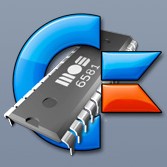I'm not a true mechanical keyboard enthusiast. I mean I like a good keyboard for typing code, so I rolled with model-Ms in the 80s and 90s, then some expensive Cherry keyboard I only recently retired because it was utterly spent (and it was PS/2), and now I happily use a Wooting Two HE.
I'm so glad the mechanical gaming keyboard scene has developed so much: it means there's a plethora of really excellent keyboards for the rest of us who don't play games.
But something utterly baffles me: why are high-quality keyboards getting smaller?
There's a lot more keyboards without the numpad and the block of middle keys - whatever they're called - or with the middle keys reduced or squashed up awkwardly on the side, than full-size plain old 102- or 104-key layout keyboards. What's wrong with the numpad? Isn't more keys generally better?
Back in the days, I bought the original Happy Hacking keyboard because it kind of made sense to maneuver around in our server room with a small keyboard that took up less space. Typing on it drove me up the wall but it was convenient to carry. And I guess it was also good option for going to LAN parties with a smaller backpack. But other than that, for a keyboard that never leaves your desk, I don't get it.
Are there other advantages to smaller keyboards? Genuine question! I'm not dumping on smaller keyboards: to each his own and if you're happy with yours, more power to you. I'd just like to know why you prefer smaller.
Smaller keyboards:
- Encourage you to move your hands less. Part of this is allowing your mouse to be closer, especially if you’re right handed.
- Aesthetically look cleaner and less cluttered
This is it for me, I basically don't use those keys daily and can access them via a function key when I rarely need them, so I'm gonna prioritise the aesthetics and compactness.
For me, having the symbols I use in a function layer is better than having them spread around, because I don't have to move my hands as much.
Point 2 is absolutely subjective, though. Personally, I think a full size or TKL look a lot better than a compact. It's too distracting seeing something "missing" from a traditional setup. Though, I also like to have my keyboard and mouse a good distance from each other and spread out, rather than close and centered in front of me.
Hoo boy. This is an issue close to my heart about which I could talk for an unreasonable length of time.
I'm an accountant. Yes, spreadsheets. I always thought I you'd have to pry my numpad from my cold dead hands.
About 6 months ago I bought one of the saucy little mech boards of which you speak. A keychron k6. It was a whimsical purchase. It would make my thinkpad set up look better when I posted pictures to /r/thinkpad.
Turns out, I love using it so much that I can do without a numpad.
The core element to answer your "why not full size" question is simply that this little harlot fits in my backpack, where a 100% board would not.
Anyhow, I have a d-pad, and 2x function keys that can modify any key to whatever you want. So I don't miss having any of the extra special keys. It took surprisingly little time to get used to.
On occasion, I do have to grind through entering a list of numbers, but it's really not that often and doesn't take that much extra time.
I don't know but I feel the same. My main gripe is with media keys, because I don't want Fn key combinations, but dedicated media buttons, which is increasingly rare. The most appealing keyboard I have laid eyes on recently is Das Keyboard which has a volume wheel, media keys and is full size, but it's very pricey and not perfect still.
It is because mech keyboards are really expensive and people sacrifice size for affordability. That's one of the main reasons anyway. Also you can then buy a numpad separately, I like a separate numpad.
70% is the happiest middle ground for me: still have function row so less modifier-holding required (vertical space was never the issue) & tighter than tenkeyless while not giving up keys. Luckily these are readily sold & the default laptop keyboard setup. Numpads IMO are a niche peripheral that are rarely used & add stress to mouse usage since that numpad has to be crossed over every time for the average user; separate numpads can be bought and located somewhere more ergonomic.
I'm a severe numpad hater but I hate when they also steal the arrow keys.
I've recently built and am transitioning to a 50-key split-ergo keyboard. I code for a living so, a bit of getting used to, to be honest. The big advantage is in ergonomics and portability. Fewer keys means that fingers have less travel distance.
I've never used the numpad when I did have a full sized keyboard, and I want a smaller keyboard because the distance from the mouse and the WASD is smaller, which is more comfortable for me when gaming, but also when switching between typing and navigating with the mouse, the shorter distance is more pleasant.
I use a 75% keyboard because I don't want a numpad, but I do want the arrow keys and F row without needing a function layer for them.
I have a 40% ortholinear kb because it's more ergonomic. My fingers are never have to travel more than 2 keys away from home row. There are enough built in layers that I never feel like I'm missing a key. All keys are remappable. Beyond that I think it looks neat - folks always ask about it when they see it. When using a mouse and keyboard, my arms are kept at a reasonable distance apart (overall hands are closer together), so I can work or game longer without feeling like my shoulders or back are strained.
For most users/use cases, there isn't a need for for so many dedicated keys - if they are prepared to learn layouts with multiple layers. There are several notable advantages: cost, portability, reduced footprint (keeping hands closer together when using mouse and keyboard), and reduced finger travel/stretch. These last two are good preventative measures for carpal tunnel.
I chose a 40% ortholinear keyboard specifically because I make heavy use of the numpad in my work. I keep the numpad on one of four layers and I find using it to be quicker and more seamless to transition to than when using a full sized keyboard. I only wish that more manufacturers made ortholinear layouts....
I rather have my keys closer to the mouse. I don't miss having a num pad at all.
Numpad not needed since already have number keys above the alphas (and you can buy separate tenkey pads if they’re really needed). The extra space on desktop gained by a shorter keyboard is far more useful. All of mine except two are TKL, the others are 60%. Below that you fall into specialist territory and having typed on QWERTY layouts with function keys for decades I think I’m a bit too old to unlearn and relearn typing, but some people find it fun to use weird and wonderful ortho, dactyl or 40% keebs with multiple programmable “layers”.
I use the numpad quite a bit when entering lots of numbers with one hand. Comes up a bit in drafting, some data entry... Some video games.
This thread has made me curious though. That said I am very attached to my 15 year old logitech keyboard. Done some soldering, cleaned a lot of beer out
It probably feels more ergonomical, I would also have a smaller if I were to buy one tbh
There’s a lot more keyboards without the numpad and the block of middle keys - whatever they’re called - or with the middle keys reduced or squashed up awkwardly on the side, than full-size plain old 102- or 104-key layout keyboards.
I don't like reduced-size keys or reshaping the block of six keys. My guess is that reshaping the block of six keys (Insert, Home, etc) is to mirror laptop layouts, so one doesn't have to switch between different layouts mentally. No real need on a desktop, but on a laptop, space is often at a premium.
But getting rid of the numpad is something that I am definitely enthusiastic about.
There aren't that many uses for the numpad. In my experience:
-
You actually do a bunch of numeric entry. I think that very few people do this, but for those people, sure, it's useful.
-
A few games use it, largely because it happened to be there for numeric entry. Because laptops don't generally have a numpad, shifting to keybinding schemes that use it have become far less common.
However, the numpad sits right where the mouse would ideally be if the keyboard is reasonably centered.
In general, I'd rather have my hands stay on the home row. If you have to use keys off in neverland, like arrow keys or F-keys or the like, you need to relocate your hands. Preferable to use modifier keys and chord them with regular keys in the "main block" of keys. If you're a vi or emacs user, you likely don't use the arrow keys for cursor movement.
There was also a trend back around, oh, early 2000s to have a bunch of extra keys added to the keyboard, stuff like Play, Pause, etc. That seemed to kinda fall out of favor.
-
I have a Glorious GMMK2 that I took to the office. It has arrow keys and the page up/down and end keys. (Home is fn+end). I find this to be the happy middle for me. The tiny boards with no arrows were frustrating. Big boards I get uncomfortable after a while due to the mouse being so far away. A smaller board that has the keys you regularly use is more ergonomic since you can keep your arms and hands closer to your core. I don’t mind using fn to access function keys or more rare use case keys. This very much comes down to what you do on your computer. When I had to type in user IDs non-stop working on a help desk…numpad was important. I don’t type strings of numbers as frequently now so it is not as important.





